Peter MALONE
Saturday, 18 September 2021 19:56
Jack Taylor: Shot Down
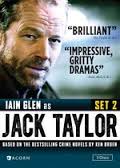
JACK TAYLOR: SHOT DOWN
Ireland, 2013, 100 minutes, Colour.
Iain Glen, Hazel Doupe, Nora –Jane Noone, Michael Collins, Karl Shiels, Emmet Kirwan.
Directed by Stuart Orme.
Jack Taylor: Shot Down is the sixth television film in the series featuring Iain Glen as Jack Taylor, former member of the Garda in Galway, disillusioned with his experiences, let loose in the south of Ireland and becoming involved in private detection.
This film focuses on Jack Taylor’s rescue of a traumatised young girl at the death of her mother. He decides to become involved, though the little girl’s family are not initially enthusiastic. They are Travellers, living in their caravans, and experiencing a feud with the family of the murdered woman’s in-laws.
There are various complications, hostilities because of the feud, links with the drug trade, and emotional tangles with the dead woman, including with a non-Traveller lawyer.
The film works well as a television drama, a murder mystery, detection, or with the atmosphere of the Irish locations. As with the other films, it has been directed by Stuart Orme.
1. The status of the television series? The popularity? The original novels? The Irish settings?
2. Ireland, the towns, the world of the Travellers, the coast, the woods? The musical score?
3. Iain Glenn as Jack Taylor, throughout the series, his work for the police, his experiences in detection, tough, the shooting and the man in the coma? His relationship with Kate? Leaving the North, leaving relationships? His drinking? Freelancing? Memories and regrets?
4. His meeting Rosie in the woods, the effect, saving her? Meeting the family, offering to help, the reaction? His being hit, coming to? The visits to the various families, their hostilities? His continuing with Rosie, the investigation?
5. The Travellers, their way of life, the Catholic piety and imagery? The trailers, in the parks? The various clans? The role of Bryson, lawyer, his presence? The feuds, the bonds, Eddie and Sharon, marrying, bringing families together, yet not? The music, the songs? Eddie as a type, drugtaking, involved in drug dealing? Sweeper, his wife, care for Rosie? The revelation of the truth?
6. The abduction of Rosie, Taylor and his calling in Kate? Finding her, the guitar, Kate able to talk to Rosie? Rosie and her moving from dislike to liking Jack? Her memories, trying to surface them? Her remembering the killer, the drugs? The background of the drug dealer, the toughness,her picking the kids up from school, Michael as her henchman?
7. The grandfather, Rosie and the bond with him? The other members of his family, the young man and his abducting Rosie, framing the others?
8. Eddie, his being killed, the consequences?
9. Sweeper, the fight, Jack stopping it?
10. The unravelling of the mystery? Jack and his dealings with Rosie, remembering Bryson was present? Bryson, his personality, his links, his love for Rosie’s mother? His being present with Michael?
11. The pursuit through the woods, Jack and his return, finding Rosie, protecting her?
12. Michael, his boss, the tough stances, the shooting, his death?
13. Bryson, being wounded, the truth of his hitting Sharon, Michael shooting her?
14. The effect of this experience on Jack, and experience of being humanised, his protection of Rosie?
Published in Movie Reviews
Published in
Movie Reviews
Tagged under
Saturday, 18 September 2021 19:56
Daens
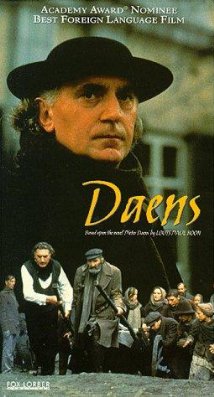
DAENS
Belgium, 1992, 138 minutes, Colour.
Jan Decleir, Gerard Desarthe, Antje de Boeck.
Directed by Stijn Coninx.
At the time of the centenary of the social encyclical, Rerum Novarum. 1891, Pope Leo XIII, Daens had a successful release in Belgium and was Belgium’s Oscar-nomination for 1992.
It is a significant picture of a priest, a 19th century champion for the rights of workers, a portrait at the end of the 20th century, at a time of critical reflection on the nature of priesthood.
Jan Declier plays Adolph Daens, a middle-aged priest who returns to his hometown of Aalst, discovering the oppressive conditions in a textile factory, with all the men are being fired so that the owners can pay lower wages to women and children who are forced to work excessive hours, children falling asleep on the job, in danger of injury from the machinery. He takes up their cause as well as the rights of other factory workers, his brother publishing facts in the local newspaper. He falls foul of criticism from the wealthy owners, from conservative Catholic politicians, from the local bishop.
He is supported by Socialist and Liberal politicians and, symbolically, by a 17-year-old, Nette, the only breadwinner in her family. Daens is a powerful preacher, making clear his views about the rights of workers. He is summoned to run by Pope Leo XIII and ordered to stop his political activities or else he will be dismissed from the priesthood. That is the option he chooses, is defrocked, but continues his campaigns.
This is the kind of portrait of a priest, in the aftermath of the Liberation Theology movement in Latin America, which stirred audiences with social concern, which stirred Catholics who were involved in social justice issues. It serves as a critique of the blindness of Christians more doctrinally-oriented than socially concerned.
Director,Stijn Coninx, also made the film Soeur Sourire about the “Singing None”, with Cecile de France in the title role. Jan Decleir is a distinguished Belgian actor. It is interesting to note that Matthias Schoonaets has a supporting role.
1. A distinguished Belgian film? Belgian history? The Catholic Church and its history? 19th-century? Social issues and concern?
2. The cast, the quality of the film, festivals, Oscar-nomination?
3. Belgium, the 19th century, the town of Aalst, its look, middle-class citizens, the priest, the factory owners and lavish lifestyle, the factory workers, the visuals of the factories and conditions? The musical score?
4. 19th-century industry, the response of Catholic Conservatives, politics, the church? The social consequences?
5. The character of Daens as a priest, his age, experience, returning home, staying with his brother, his lifestyle? Observing the situations of the textile factory, going into action, taking up the cause, personal, his brother’s articles speeches and sermons? Relating to the people?
6. Textile factory, the visuals, the conditions, the machinery, women and children? The contrast with the lavish lifestyle of the owners? The workers, the men being fired, lower paid women and children, their falling asleep, the danger from the machines?
7. The new crisis, 50% of the workers to be fired? The articles, policies, the politics?
8. Daens and his support, Nette at 17, the breadwinner? Her support for Daens? Her relationship with Jan, the Socialist, support?
9. Daens and support from Liberal and Socialist politicians? The criticism by the Bishop? The bosses, the politicians, the church?
10. Daens being summoned Leo XIII, the putting of the choices, the role of the priest, not a politician? Daens choosing to continue his work, its success?
11. Daens as a rallying point for the workers? In the context of social justice documents by the Catholic Church and Leo XIII at the end 19th-century?
Published in Movie Reviews
Published in
Movie Reviews
Tagged under
Saturday, 18 September 2021 19:56
Devotion
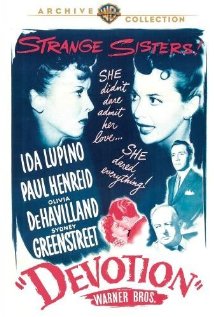
DEVOTION
US, 1946, 107 minutes, Black-and-white.
Ida Lupino, Olivia De Havilland, Nancy Coleman, Sydney Greenstreet, Arthur Kennedy, Dame May Whitty, Victor Francen, Montagu Love.
Directed by Curtis Bernhardt.
Devotion is a Hollywood biography of the Brontë sisters and their brother, Branwell. While obviously filmed in Hollywood studios, Devotion is an attempt to recreate the Yorkshire village of Howarth where they lived, the inns, the streets as well as the rectory where the father was the priest and Arthur Nicholls was his assistant. It is in the 19th century.
There are also scenes in a school in Brussels where Emily and Charlotte Brontë went for a short time to further their education. There are also scenes in London when Charlotte goes to meet the press on the release of Jane Eyre and she meets with Thackeray.
The film is highly emotional. Ida Lupino has a very good role as Emily, devoted to her brother, loving her sister, Charlotte, but finding her flighty, loving the younger sister, Ann. After initially misjudging him, she is devoted to the assistant priest, Arthur Nicholls, played by Paul Henreid. She loves the moors and in fact and in the imagination wanders Wuthering Heights. Olivia de Hafilland plays Charlotte, more emotional, more ambitious, enjoying time in Brussels, relishing the time in London. Nancy Coleman plays Ann, the younger sister who stays at home
Arthur Kennedy has a colourful role as Branwell, an artist, an alcoholic, clashing with his sisters, and dying young – as did Emily. Nicholls is the object of unrequited love by Emily, he himself loving Charlotte, and eventually marrying (after the time span of the film).
Sidney Greenstreet enjoys himself portraying Thackeray.
Devotion was directed by Curtis Bernhardt who had come from the continent and directed a number of dramas and melodramas at Warner Bros and MGM. It has a score by the celebrated Erich Wolfgang Korngold.
The film was completed in 1943, the time of Olivia de Havialland’s court case against Jack Warner about her contract, her winning and his punishing her by her giving her third billing and not releasing the film until 1946 (ironically the year she was to win her first Oscar for To Each His Own).
There was a French version of the Brontë Sisters in 197989 which included Isabelle Adjani as Emily, Marie-France? Pisier as Charlotte and Isabelle Huppert as Ann.
1. A version of the life of the Brontë sisters, their brother Branwell, life in the vicarage, in the town, their pursuit of writing, the revelation of who they were as women authors?
2. Warner Brothers production, Hollywood sets, black and white photography, costumes and decor, re-creation of the period, the settings in Yorkshire, the vicarage, the town, the moors and the mountains, the contrast with the school in Brussels, London, publishing, society? The musical score?
3. The title, in relation to each of the sisters, Branwell, their father, Mr Nicholls?
4. Audience knowledge of the Brontës, their home life, sheltered lives, their imaginations, the writing, their poems and publication, their pseudonyms, the publication, acclaim? Audience appreciation of Wuthering Heights, Jane Eyre?
5. The atmosphere in the vicarage, the strict father, the death of his wife, the aunt and her management the house? His belief in Branwell, disappointment with his drinking and irresponsibility? Love of his daughters, encouraging them? Mr Nicholls and his appointment, his presence in the house? The father initially reluctant?
6. Emily, older, quiet, going out on the moors, imagination, passionate imagination? Her concern about Branwell, helping him? Finding Charlotte flighty, reliance on Ann? The first encounter with Mr Nicholls, thinking him drunk with her brother? The apology? Her writing, not wanting to go to Brussels, Mr Nicholls advising her to go? The love for Charlotte, worried about Charlotte’s flirtation with the headmaster? The teaching the children music, the performance of Chopin? Not going to the fair? The return, Branwell and his illness, Charlotte’s return, Charlotte understanding of her love for Mr Nicholls? Imagining the horsemen on Wuthering Heights?
7. Charlotte, younger, extroverted, her writing, her ambitions, with Mr Nicholls, talking about his kiss, not sensitive about Emily and her love for Mr Nichols? Her eagerness to go to Brussels, enjoying the education, the life, infatuation with the principal, flirting with him, going to the fair and the rides, the kiss in the dark, her reaction? The news that her brother was sick, the need to return, her going to ask the principal’s advice, the encounter with his wife, his stern rebuke of her and appeal to her conscience?
8. Ann, the younger sister, a talent in poetry and in writing? Staying at home, writing the letters to Brussels?
9. Branwell, his place in the family, his drinking, at the taverns, his reputation, sketching people and wanting money? Arthur Nicholls helping him home, Emily and her hostile reaction, her apology?
10. Nichols’ liking to Emily but not loving her? His attraction to Charlotte and her reactions? Mr Brontë and his not wanting an assistant, the discussions, finally accepting him?
11. Mr Brontë, clergy, this status in the village and in the church in those days? Miss Branwell and her helping with the management and bringing up of the
girls?
12. Mr Nicholls, his character, kindly, devoted, with all the members of the family, buying the painting secretly, the money to educate the sisters? His leaving, going to London? His realisation of Emily’s love but unable to respond? Charlotte and her visit to him in London? His love for her? His return?
13. The London sequences, the publishers, the Bell Brothers, the press arriving, Thackeray and his reputation, his presence, realising who Charlotte was, hosting her, his praise of Wuthering Heights? Dickens passing by and Thackeray looking down on him? Not wanting to go to East London, his escorting Charlotte to see Arthur Nicholls? The literary world of London in the mid-19th century?
14. Charlotte’s return, Emily’s illness, the realisation of the truth? Charlotte and her future? Emily and her imagining herself on Wuthering Heights and the dark horsemen coming to take her?
Published in Movie Reviews
Published in
Movie Reviews
Tagged under
Saturday, 18 September 2021 19:56
Dynamite
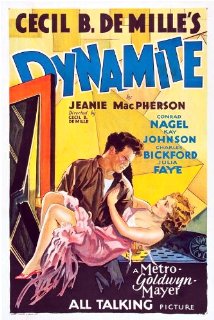
DYNAMITE
US, 1929, 129 minutes, Black and white.
Charles Bickford, Kay Johnson, Conrad Nagel, Julia Fahey, Joel Mc Rea.
Directed by Cecil B.De Mille.
Dynamite is the first sound films directed by Cecil B. De Mille. During the 1920s he had already built up his reputation for dramas, lavish sense of style, especially the sets and costumes. In 1923 he had directed The 10 Commandments, with a contemporary story as well as the re-enactment of the book of Exodus. In 1927, he had directed The King of Kings. During the 1930s, he also made a number of spectacles including The Crusades, The Sign of the Cross and Cleopatra. For more than 10 years he was to make epic action and adventures, then in 1949 making Samson and Delilah, in 1952, with the Oscar for best film, The Greatest Show on Earth. His classic The 10 Commandments was released in 1956.
Dynamite is a contemporary New York story, a glimpse of the flappers and their wealthy way of life, idle, drinking, thier conversation… This contrasts with the story of miner condemned to death for murder. The two scenes intertwine when the leading lady, Cynthia, Kay Johnson, cannot inherit her wealth unless she is married by a certain date. She goes to the prison, the miner agrees and they are formally married. At that moment, the real killer is forced to confess and the miner is released, going to the house of the socialite, despising her way of life.
She is engaged to a married man who is to divorce his wife, with whom Cynthia makes a deal about a payment for the divorce through her inheritance. Complication occurs when the will demands that she lives with her husband, so she goes to the mining town, asks if she can live in the house. The miner agrees but within days there is a difficulty when a little boy, for whom she buys sweets, runs out on to the road and is hit by a car. She does the heroic thing, drawing out some money, driving to the city and back to bring a surgeon who is able to save the boy – and the gossip stops. Unfortunately, the miner is away, believes the worst about her.
Dynamite comes into the action in the last 15 minutes of the film when the three central characters are trapped in the mine where there is an explosion and the two men have to make decisions about who will do the heroic thing and who will survive.
Charles Bickford fits the part of the miner very well. Kay Johnson is Cynthia. Conrad Nagel has a lesser role as are intended husband.
1. The career of Cecil B De Mille? His silent films? Reputation as spectacle director? The beginning of his sound films?
2. Black-and-white photography, New York, the contrast with the mining town, contrast with apartments and homes? Prison? Atmosphere? The musical score?
3. Hagon, in the court, accused of murder, his sister and his plea, the lawyers, the judge? The mining background? age and experience? Condemned to death? A tough character?
4. Cynthia, her way of life, wealth, the lawyers, her fiance, his being married, the discussions about divorce, her interactions with Sylvia, his wife? The will, the conditions, the marriage? An assertive character?
5. The headlines, the idea, her visit to the prison, the plan, the money, the little girl, the formalities of the wedding, the priest, the documents?
6. The drunk in the restaurant, the pressure on him, his guilt, confession, the phone call, Hagon saved, getting out?
7. Cynthia, her apartment, the lavish party, the New York social types, wealthy, idle, drinking, their talk? Hagon arriving? Cynthia anxious, not wanting the guests to know, Roger and his attentions? Sylvia and her listening in? Cynthia and Sylvia and their discussions about the divorce, the payment? The deal, the cheque, Roger and his anger about the cheque?
8. Hagon, his behaviour, with the staff, wanting a room, the interactions with Cynthia, her being afraid, his harsh condemnations? Leaving?
9. Cynthia, the conditions, the lawyers saying she had to live with her husband? The visit to the mining town? Meeting Hagon, his sister? The request? His agreeing, his concern about his reputation? Going into the house, wanting the car to go shopping, his refusal, the car in the garage? Trying to make the meal, the little girl helping? Hagon, his work in the mine, reliable, an ordinary character?
10. Cynthia at the shop, the women’s hostile reactions, gossip? The little boy and the sweets, running out, the accident, the doctor unable to help, her getting her car, the cheque for the doctor, driving back and forth, getting the surgeon? The women and their change of heart?
11. Hagon coming home, nothing ready, believing the worst about Cynthia? Her phoning Roger, his coming to get her?
12. The touch of relenting, going to the mine of the apology, going down, Hagon and his work, the explosions?
13. The melodrama, the chance reality of their being in the mine and trapped? The dynamite? Cynthia and her reaction? Each man wanting to do his duty, going to Cynthia, her dilemma, making a decision?
14. Roger, with the dynamite, making that choice, his death? Leaving Cynthia and Hagon – and what future?
Published in Movie Reviews
Published in
Movie Reviews
Tagged under
Saturday, 18 September 2021 19:56
Bittersweet
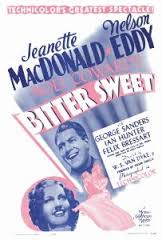
BITTERSWEET
US, 1940, 94 minutes, Colour.
Jeanette Mac Donald, Nelson Eddy, George Sanders, Ian Hunter, Felix Brassard, Edward Ashley.
Directed by W.S.then Dyke.
Bittersweet is one of eight musicals starring Jeanette Mac Donald and Nelson Eddy. Their fans will be very happy with this film, a lot of singing, especially in turn-of-the-century Vienna, full of colour.
What is of particular interest is the fact that the original play was written by Noel Coward, as with the songs and lyrics, They have his particular rhythms, the touch of recitative speech rhythms as well as his more romantic lyrics.
Jeanette Mac Donald plays a young British woman who is engaged to an aristocratic but completely insensitive young man. She, however, is infatuated with her Austrian music teacher, Nelson Eddy. At a party for her engagement, with her mother and various aristocrats in attendance, she sings, to the disapproval of her fiance who is also attached to a young woman who always pronounces the letter R as W. In the passion of the moment, with the teacher intending to return to his home, with the help of one of her friends, she elopes with him.
As they reach Vienna by train, they encounter a military hussar, head shaven, monocled, played with an accent by George Sanders, a dastardly type who later arranges with a restaurant owner to employ Jeanette Mac Donald, but to have her available for his own fancies.
The couple are impoverished, their furniture being sold by their two friends enabling them at least to eat. They decide to sing in the streets and, by chance, come to the attention of an English lord, Ian Hunter, who feels that their singing brings him like at the gambling table (his rival being George Sanders). This leads to some patronage and employment at the restaurant, managed by Sig Ruman.
In the meantime, Nelson Eddy continues his composition, They try to tutor the daughter of a grocer in order to get a chicken, struggling, even when they work at the restaurant, with Nelson Eddy playing and Jeanette Mac Donald waiting to sing.
George Sanders engineers a dastardly set up, with the restaurant owner pretending to invite a musical impresario. The good news is that he is there already at the invitation of the Englishman. The bad news is that Sanders wants to waltz with Jeanette Mac Donald, Nelson Eddy opposing, swords are drawn and Nelson Eddy dies. That is the bitter part of the title.
The sweet part is that the impresario and the English Lord collaborate with Jeanette Mac Donald to complete the operetta and have it performed – the ending with Jeanette Mac Donald and Nelson Eddy appearing in the sky, their singing together.
For fans of the golden years of Hollywood and for the fans of the singing stars – as well as fans of Noel Coward.
Published in Movie Reviews
Published in
Movie Reviews
Tagged under
Saturday, 18 September 2021 19:56
Gallows, The
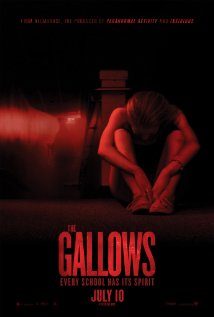
THE GALLOWS
US, 2015, 81 minutes, Colour.
Reese Mishler, Pfeifer Brown, Ryan Shoos, Cassidy Gifford.
Directed by Travis Cluff, Chris Lofing.
While this is a horror film for audiences of all ages, the adult audience will be interested in the old devices used for a ghost story and hauntings as well as the elimination, step-by-step, of the cast.
On the other hand, the teenage audiences for The Gallows will be more into the characters and the story, senior high school students of their own age.
One of the co-writers, co-directors, Travis Cluff, was not much older than his characters when he worked on the film, assisted by an older collaborator, Chris Lofing, who bring some film directing experience to bear on the project.
As with so many of these films, there is an important prologue, the performance of the play, The Gallows, with a historical setting and a thee and thou dialogue, where the main actor ascends the gallows – and, through an accident, is actually hanged.
We are moved on 20 years and introduced to some footage of the Nebraska police. So, this is a “found-footage” film, replete with hand held camera work, video cameras as well as phone cameras. (Though, on closer examination, it is very difficult to work out how all these cameras could have taken all the shots – probably a more objective camera capturing a lot of the moments.) One of the consequences of this kind of filming, inaugurated by The Blair Which Project and fostered by its many imitations as well as series like the Paranormal Activity thrillers, is that anyone who gets nauseous with this kind of continued camera movement and jerking may well be advised to give The Gallows a miss.
The footballer is called Reese and the would-be actress is called Pfeifer (the given names, in fact, of the performers). The friends are called Ryan and Cassidy (also the names of the performers).
The plan is to get into the school at night and destroy the set for the play. They get in, Ryan having a or compulsion to film absolutely everything. Ryan is definitely an obnoxious character, rather self-inflated, self-absorbed, and busily masterminding the mayhem. Many of the audience might be hoping that he would be the first to go… Actually, Cassidy is not all that much better.
Things begin to go bump in the night, many doors are locked so no frantic escapes, the lights do not work, there are eerie presences, moments of apparitions, which seem to be the vengeful ghost of the poor young fellow who was hanged in the Gallows in 1993.
The running time is not particularly long, just enough to have the setting of the characters, home life, sports activities in the school, rehearsals for the play, and the time in the dark and in the school, in the darkened theatre, in the dark on stage, in the darkened set framework, in darkened corridors…
The two survivors decide that while they are there in the theatre, they might as well rehearse their performance, repeating the lines that we saw earlier in the film, the actor ascending the Gallows and…
Probably best recommended for high schoolers indulging in a screening for a Scream Night.
Published in Movie Reviews
Published in
Movie Reviews
Tagged under
Saturday, 18 September 2021 19:56
102 Dalmatians
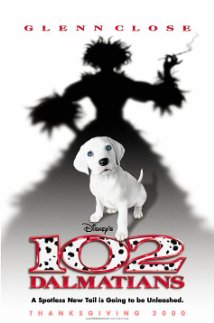
102 DALMATIANS
US, 2000, 100 minutes, Colour.
Glenn Close, Gerard Depardieu, Ioan Gruffudd, Alice Evans, Tim Mc Inerney, Ben Crompton, Ian Richardson, Jim Carter, Ron Cook, Timothy West.Voice of: Eric Idle.
Directed by Kevin Lima.
It's the 101 over again except that Cruella de Vil now wants a cap with her spotted fur coat and there is a new romantic couple. The film plays like a live-action cartoon with an emphasis on mishaps and pratfalls, on Glenn Close being an over the top witch and Gerard Depardieu mincing around as a fur-making villain - and, of course, cute pups. The whole thing is designed for youngsters rather than adults.
1. The popularity of the cartoon version of 101 Dalmatians, the cartoon life-action version of 1996? The atmosphere for a sequel?
2. The British settings, London, dog pounds, parole officers, jails, Cruella’s mansion? Score?
3. The special effects, the realistic animals, their voices and communication? Human expressions? The role of Waddlesworth, the bird who thought it was a dog? Eric Idle’s comic repartee?
4. The aftermath of the original film? But a repetition of the original plot? The scientist and his work in the prison? Aversion therapy? The lawyer visiting and seeing all the examples of change, opposites in harmony? Cruella and her being happy with the animals?
5. Chloe, the work as a parole officer, the visit from Ewan, her control, her expectations? Hearing about Cruella? Finding that she was on her list of parolees? The visit, Cruella and her manner, reformed?
6. Ewan, his work of the dog Centre, with Kevin, Kevin and his prison record for rescuing dogs? Their set up, training the dogs, rehabilitation?
7. Chloe, her Dalmatians, Kevin and the dogs? The encounter, the attraction? The dates? The Punch and Judy Show?
8. Cruella in prison, her manner, her look, clothes, hair style? Getting out? Her reliance on Alonso? His subservience to her?
9. The gongs, releasing the conditioning? The animals changing? Cruella changing, going back to her old ways?
10. The fashion show, Le Pelt, his dandy manner, the encounters with Cruella? The fashion show? Her advice, the plans? Spots and dogs and furs?
11. Chloe and the dog, the past experience with Cruella, giving birth, the pup without any spots?
12. Cruella and her disdain of the pet that Alonso gave her? Her plans for the abduction of the dogs, setting up Kevin, Alonso putting the stolen dogs back, his past record, his going to prison?
13. Waddlesdworth, the comic comments, thinking he was a dog, going to the prison, getting the key and singing the lullaby, Kevin getting out, the need for rescue – and Waddlesworth flying, then knowing that he was a retriever!
14. The dogs, the capture, the network of animals around the city, their communicating?
15. Cruella, with the dogs, Pelt, the plans, the cruelty, skinning the dogs?
16. Alonso and his change of heart, his cooperation, leading to the rescue of the dogs?
17. Paris, Kevin and Chloe going there, the capture of the dogs? their being liberated? Cruella, in the bakery, her going through the whole process of cake making, her arrest?
18. The saving of the dogs – Cruella’s money going to Kevin, and happy ending?
Published in Movie Reviews
Published in
Movie Reviews
Tagged under
Saturday, 18 September 2021 19:56
Coming Home/ China, 2014

COMING HOME
China, 2014, 103 minutes, Colour.
Gong Li, Chen Daoming, Zhang Huiwen.
Directed by Zhang Yimou.
A word about the director and his career helps give context to this fine but small film.
In the 1980s and, especially, in the 1990s, Chinese director Zhang Yimou made a number of rather small films with contemporary settings, sometimes going back to the more immediate past. In many of them, his leading lady was the actress Gong Li, the star of this film. If any audiences have ever seen Ju Dou, The Story of Qui Ju, or, especially, Raise the Red Lantern, they would look forward to seeing Coming Home. At the turn of the millennium, Zhang Yimou made two very fine films, Not One Less and The Road Home. But then he turned his attention to Chinese history, heroics, martial arts – often in the fantasy vein of Hidden Dragon. Hero, House of Flying Daggers were amongst those films. And then he was designer for the Beijing Olympic Games.
With this film, he has returned to his earlier simplicity and audiences will appreciate it, a small film, perhaps emotional and moving for many audiences, but a fine film and humane film.
The plot is quite straightforward. It is the time of the Cultural Revolution and life in the Chinese town like the one presented here is fairly colourless and drab. A school teacher lives with her daughter, shunned by many because her husband, a professor, has been imprisoned 10 years earlier. But news comes that he has escaped. His daughter, training for ballet (a particularly patriotic and militaristic ballet it is) has completely rejected her father.
The wife, played by Gong Li (who is now in her late 40s), is faced with the dilemma, to welcome her husband or denounce him.
In a very dramatic sequence, the husband is recaptured and imprisoned again. His wife and his daughter both see what happens. There are consequences for both, the wife so traumatised that she has what a psychologist describes as psychogenic amnesia, not forgetting everything, though she seems to be moving into a state of dementia, but an inability to recognise her husband.
In fact, the latter part of the film shows the end of the Cultural Revolution, with the husband returning home a free man, but his wife unable to recognise him. One of the good things is a reconciliation with his daughter who tries to help him. There are many moving, emotional moments in this part of the film when the husband tries many ways to help his wife recognise him, explaining things to her but she is still afraid; tuning her piano and delighting her in playing again, but she does not recognise him; then sending her all the letters that he wrote in prison on scraps of paper and offering to read them to her while she listens entranced.
Over the years, she always goes to the railway station, expecting her husband to be among those returning from the prison camps, always failing, always watching, always waiting.
The film has no easy answers but immerses its audience in the experience of the wife who desperately loves her husband and wants him to return but does not recognise him and the husband who has suffered so much and longs to be with his wife as they were together in their loving past.
Those who relish older films, especially from the golden years of Hollywood, may remember Greer Garson in Random Harvest, finding that her husband, Ronald Colman, suffers from amnesia, and her standing by his side for years without his recognising her, helping him in his life and career. This one does not have the final comfort that Random Harvest does. This is expert and small Chinese cinema at its best.
1. A Chinese story? The cultural revolution? Ideologies? The Cultural Revolution? The end and the significance of changes? The 21st century perspective?
2. The director, his career, his small Chinese stories? His martial arts films and history?
3. The presentation of a drab China, the town, apartments, Ballet School, the streets, the railway station and its details? The later sequences, continued drabness, homes, the shelters? The perspective in China’s drab past?
4. The title, for Lu, the threats after his escape, the effect of her father’s absence on Dan Dan, the escape and her husband’s coming home, the effect on Yu? The experience of his recapture, the amnesia and its effect, his actual coming home after the end of the Cultural Revolution? Dan Dan? Yu?
5. The ballet framework, Dan Dan and the training, working hard, the program, its ideology, patriotism? Dan Dan then wanting the central role? Not being chosen, the influence of her father’s reputation? Crying in the street? Blaming her father?
6. Lu, the 10 years in prison, the professor, his arrest, the criminal charge? Critique of the government? Urging his daughter to continue her ballet dancing? The visits to his wife and daughter by the officials, wanting information, the threats?
7. The opening with Lu, the train, hiding? Wanting to come home, coming to the door, knocking, Yu and her fears, locking the door, his writing the note? Seeing his daughter, her reaction, confiding the information to authorities? Yu, preparing the food, going to the railway station for the meeting? The officials? Dan Dan and her presence? Yu urging her husband to run?
8. Three years passing, the changes, the end of the Cultural Revolution? Lu and his freedom? Dan Dan at the station to meet him, taking him to the factory and the dormitory, his going home, going inside, looking at the photos? Yu arriving, not recognising him, the violent reaction? Ousting him? Thinking that he was her persecutor?
9. Lu, finding shelter, Dan Dan helping him? His wife’s reactions, attempting to understand her, the psychologist and the explanation of the psychogenic amnesia?
10. Yu, her life, the amnesia, her reputation, as a teacher? The notices for guidance on the walls? The years? Continually going to the station, seeing the men and women arrive, her notice? Lu, his attempts to break through, the piano, working as a piano tuner, playing the piano, his wife almost recognising him? The box of letters, his opening them, the continued reading the letters to Yu, writing new letters and directing her, especially about reconciliation with her daughter? Dan Dan dancing at home for their delight?
11. The attempt with the photos, the albums and Dan Dan having cut out his image? Going to the friend, the photo when young, Yu and her treasuring the photo? The continued going to the station, in the rain, painting new notices, never finding her husband?
12. The truth about Feng, the authority, his hold over Yu, the sexual assaults? Lu visiting Feng’s wife and her violent reaction, his imprisonment? The scene in the bedroom, her husband gently putting the covers over, her terror?
13. The letters persuading Yu to let her daughter come home?
14. The years passing, the two getting older, her still going to the station, doing her hair?
15. The final image of a couple waiting at the station – what future?
Published in Movie Reviews
Published in
Movie Reviews
Tagged under
Saturday, 18 September 2021 19:56
Self/Less
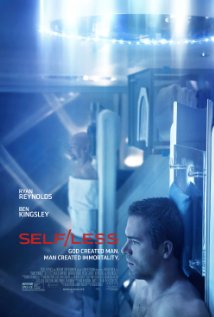
SELF/LESS
US, 2015, 117 minutes, Colour.
Ryan Reynolds, Natalie Martinez, Matthew Goode, Ben Kingsley, Victor Garber, Derek Luke, Michelle Dockery.
Directed by Tarsem Singh.
The premise of this drama which, perhaps unfortunately for the very serious-minded, becomes something of an action and shootout film towards the end rather than staying with the implications of the drama, is very interesting. Some films explore cryogenics in which the person pays a company to freeze their body, to be thawed later so that the person might have a new life – later. The premise of this one is that a scientist has worked out a process by which an ageing and ill person can have a soul or a self-transfer from the debilitated body to a healthy body and come alive, younger, stronger. The limit, however, is that the transferee should not having any contact with their past.
In the early moments of this film, billionaire Ben Kingsley, a sometimes ruthless head of business, who is alienated from his social-minded protester daughter, Michelle Dockery of Downton Abbey, decides that he will make the transfer. He is in the power of a young, rather cool and calculating scientist played by Matthew Goode.
If you have read the credits on the advertising and seen Ryan Reynolds as the star of the film, you will quickly realise that he is the one who provides the body for the transfer.
Were this a documentary, that might be the end of it as the new person lived happily ever after this breakthrough process. But this is never the case in science-fiction. Writers and audiences seem to prefer the Frankenstein mythology, that the scientist or the doctor usurps their human capacities with hubris that makes them want to “play God” and they create a monster.
It is slightly more subtle here, with reminiscences of people who believe in reincarnation and have memories from their past. The billionaire in his new body, initially wants to live the high life of self-gratification, but images surface, images from the past, from the character of the body they now inhabit. Here is a moral dilemma. Does the new inhabitant suppress the memories of the past or encourage them, follow them through, search out the story of the original person in the body.
Since this is a science-fiction film, it is obvious that the billionaire is going to try to find out what happens, discovering the truth, discovering the motivation of the man for surrendering his body, the repercussions for his wife and daughter.
And, of course, the scientist will be none too pleased (and there is an interesting twist on his identity as well) and repercussions for a close friend of the billionaire and his sickly son.
The writers of this film are in fact Spaniards, the Pastor Brothers, who have written some horror stories in the past. It means then that their road towards culmination will draw from action and horror rather than from psychological resolution, which will not only involve guns but also a flamethrower.
While this means that what might have been something of an art-house science-fiction exploration of identity, the nature of the self, the self becoming less than it was, and the potential for selflessness in the altruistic sense (and all those meanings are included in the title of the film), it goes to a more multiplexed mentality culminating in action, melodrama, but not without romantic hope.
1. The title, the initial meaning of the word and its obvious implications? Each part of the word, the significance of the /? Many meanings? The science fiction aspects? Selflessness for others?
2. The plausibility of the plot, the sclence, the moral issues?
3. The New York settings, affluence, the big companies? New Orleans, the laboratories, the jazz city and performances? Missouri, the countryside, the home? Authentic USA? The musical score?
4. The validity of the premise, the introduction to Damian Hale, his age, personality, his work, his millions and his company? Alienation from his daughter, going to see her, watching her, offering her money and her rejection of the cheques? His long friendship with Martin, the meal, the brash young man, admiring Damian, yet being humiliated and ousted? Damian ill and dying? The card with the name of the scientist? His memories of the interview, the video of the scientist explaining life and death? Damian’s collapse, his decision, going to the hospital?
5. Dr Albright, in himself, age, suave manner, British? His explanations about the procedure, his cold and calm manner, the issue of money? The conditions, the new body, and new life, the transferring of the brain, the contact with the past?
6. The two bodies lying together, the new body, unconscious, the attendant assisting the procedure, reassurance, the transfer?
7. Damian gradually waking, the new identity, gradual, weak, the wobbling images, the need for pills, the swimming training, getting stronger, ready to go? Albright and his reassurance of the delivery of the pills?
8. New Orleans, life, the new life of Damian, the younger appearance, sexual encounters, the music of the city, yet disturbing images in his consciousness?
9. New memories, Albright and his slip about the Latin woman, memories of the child? His being upset? Albright recommending him to get away? The memories of the water tower, googling to find it, the location, Missouri, going to St Louis and changing his flight?
10. Driving, the water tower, finding it, going to the house, seeing the photos, identifying the body, the arrival of Madeleine, with the gun? The arrival of Anton and the other guards, Anton and his playing basketball with Damian? Powers of persuasion, the guns, the flamethrower in the house?
11. Damian as Mark, the escape, taking Madeleine, the memories, his military strength coming back, his military tactics? Going to the school, the little girl, the background of her illness, being well, her joy at seeing her father?
12. The explanation of Mark’s motivation, his daughter’s illness, the insurance, selling his body, presumed dead?
13. The escape to find Martin, the discussions and trying to persuade him of the truth? His teaching the little girl how to swim? Madeleine and her kissing, her response? Her accepting the truth? The little girl wandering, finding the little boy, the emergence of the truth about the little boy’s illness, his new body, Martin and his wife?
14. Martin, his phone call, the agents coming, mother and daughter escaping through the woods, their being taken by car? Mark, his escape?
15. Googling the original scientist, finding is wife’s address, his going to see her, Albright arriving, the truth about him and his wife?
16. Mark, the martial arts fights, going to Albright, needing medication? Martin and his formula and information about how to get replenishment of the pills?
17. Going to Albright’s laboratories, the henchman, the fights, Mark and his attack, the flamethrower? The shooting? The film turning into an action show?
18. Damian, his ceding his personality, so that Mark might fully recover, reunited with his family?
Published in Movie Reviews
Published in
Movie Reviews
Tagged under
Saturday, 18 September 2021 19:56
Ant-man
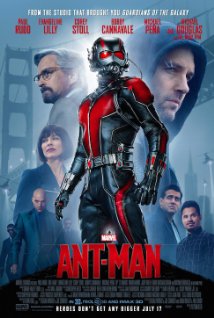
ANT-MAN
US, 2015, 117 minutes, Colour.
Paul Rudd, Michael Douglas, Evangeline Lilly, Corey Stoll, Bobby Cannavale, Judy Greer, Abby Ryder Fortson, Michael Pena, David Dastmalchian, T.I., Wood Harris, Hayley Atwell, John Slattery, Martin Donovan, Anthony Mackie.
Directed by Peyton Reed.
A full confession! This is a realisation that early into Ant-man, this reviewer was believing all the science, accepting that living creatures could be shrunk, that this kind of activity could be credible!
Which leads to say that Ant-man is a very entertaining and enjoyable film.
Marvel comics have a long reputation for their comic strips and comic books in print. In fact, Ant-man was first released in 1963. However, it was the other superheroes who made it earlier to the screen, stories of The Hulk, of Captain America, of Iron Man, of Thor, episodes for all the heroes, many sequels and, of course, The Avengers films.
With due respect to the last Avengers film, The Age of Ultron, Ant-man is far more enjoyable.
In the late 1980s, scientific researcher, Dr Pym, was developing techniques for reducing living creatures. But, it was the time of the Cold War and he was being looked on with some hostility by CIA authorities. He then retired but continued his work, even after his protégé, Darren Cross, took over his company and laboratories.
Present day. Darren Cross has almost succeeded in his shrinking techniques and experiments on creatures, including lambs, until he has success. While he is brilliant at science, he is also a greedy man in love with power and plans to sell his research to the highest bidders, irrespective of their motives and their plans for domination. Dr Pym does not approve. But his daughter, Hope, works with Dr Cross.
Also present day. pleasant burglar, Scott Lang is about to be released from prison, gets fired from his fast food job because of his past, shares an apartment with Luis, a motor-mouth when it comes to telling a story with excessive detail, and two of his friends. Scott is being prevented from seeing his daughter by his ex-wife and her new partner who is a police officer.
These two present-day scenarios then connect, with Scott doing a burglary job in Dr Pym’s house, then becoming a candidate for the experiment for a shrinking man. Dr Pym’s motives are good, wanting to stop Dr Cross and deciding to use his Ant-man to infiltrate and destroy Dr Cross’s experiments – including Cross shrinking himself as Yellowjacket.
Some of the most entertaining scenes are Scott’s training to be an Ant-man, experiencing what it is to be so small and in danger from ordinary situations, like water in the bath becoming a deluge, like exercising mind control over ants and their activities, finding Anthony, a giant ant on whom he could ride to battle. Dr Pym’s daughter had hoped to do battle for her father but he wants to protect her, especially when she learns the story of her mother who was a partner with her husband and gave her life for experiments.
So, this leads to a set up for confrontation between the two Ant-men, Goody and Baddy.
This film is certainly not predictable like the other action hero stories. While Scott, Ant-man, as a criminal background he is something of a hero, but very small, and, while his activities will contribute to saving the world, they are not cataclysmic and apocalyptic like the battles in other Marvel films. And there is a great deal of humour, in the characters, the mannerisms, the deadpan remarks, and the frustrations that Scott experiences during his training.
Often, the film is quite funny.
Of course, there is action in the final confrontations, not always going as might be foreseen, which makes them very enjoyable, a good blend of action and special effects.
The cast should be mentioned by name and praised. Paul Rudd has appeared in many a comedy, with touches of romance. The part of Scott Lang suits him and he makes the most of it with self-deprecation, funny lines, attempts at heroics, motivated by possibilities for seeing his daughter, and rising (no matter how miniature) to the dangerous occasions.
Dr Pym is a very good role for Michael Douglas who carries it off with great aplomb and credibility. Evangeline Lily plays his daughter. Corey Stoll is both smooth and smarmy as well as corporation-evil personified as Dr Cross. Michael Pena has most of the comedy as Luis, his comic reactions to everything (although some solid punches when necessary) along with his two friends, seeming slackers, who nevertheless are essential for the final success.
There is a guest appearance by Anthony Mackie as The Falcon – and, of course, the advice is to remain till the end of the credits to see where this is all leading.
1. Marvel Comics and their reputation? The comic books, popular through many decades? The films? The development of screen heroes to The Avengers?
2. Ant-man and the comics, not pursued for films, yet the links with SHIELD and The Avengers?
3. The adaptation from the comic, characters, the science, heroics, the plot development of shrinking living creatures? Ant-man not as a typical hero? Criminal background? Motivation? Fathers and daughters? Darren Cross as the villain, usurping the role of Dr Pym, buying his company, greed, clients, the build-up to conflict? Confrontation?
4. The serious tone of the film – yet the amount of comedy, the welcome light touch?
5. The special effects, reductions and shrinking is, the situations for small creatures, being crushed? The role of the ants? Anthony? The training, getting into the laboratory, the confrontation, battles and explosions? Living in and out of shrunken situations?
6. The action, ordinary, punches in the jail, the reductions, the dangers, the training and confrontations?
7. The prologue, the 1980s, Dr Pym, the presence of Michael Douglas? His research, discoveries, inventions? The Moscow, the Cold War, the situation? The executives and the confrontations? Mitchell Carson and his hostility, threats, Pym punching him? Dr Pym retiring?
8. The present, Darren Cross and his enterprise, the invitation to Dr Pym, to his daughter? The science and the detailed and technical explanations? The reduction and shrinking? Cross and his experiments, with the lambs – and his final success? Wanting to sell his secrets to world powers? The invitation to Dr Pym and Hope to be present?
9. The introduction to Scott Lang? In jail, the inmates, the punching bout? Leaving? Luis arriving, his comic patter, extraneous detail, missing the point? His friends and their skills? Sharing the apartment? Wanting to visit his daughter, the reaction of his wife, Paxton and his being a policeman, hostility, ousting him, threats?
10. His job in the diner, the boss praising and then firing him? The apartment, sharing, not getting any jobs? Rejections? His decision to accept the challenge of the tip-off? The humorous collage of the chain of communication, everyone speaking with Luis’s voice as he told the story? And the repetition of this technique later in the film?
11. The heist, Scott getting into the compound? Voice communication, security? The safe, opening the safe, the huge safe, the experiment with heat, contraction? Finding the strange suit and taking it?
12. Dr Pym, his visual monitors, watching, controlling? Hope and her taking sides with her father, despite the hostilities and the memories?
13. Dr Pym, communication with Scott, knowing all about him, making the offer, for his daughter’s sake, the parallel with father and daughter relationships? The tests, in the bath…?
14. The dangerous situation, Cross as a character, his experiments, clashes with Dr Pym? Feeling that the doctor had turned against him? With Scott?
15. Scott accepting, for his daughter’s sake, the training, the serious and dangerous elements, the jokes? Anthony as the ants for him to ride? The experiments with mind control? The doctor not wanting Hope to be part of it, her rivalry with Scott?
16. The revelation of the doctor’s story about his wife, sharing his experiments, her risking death, the explanation?
17. The aim to stop Cross, Cross’s success, his becoming the villain, Yellowjacket? The night, the invitation, the representatives of the sales? His previous visit to the doctor’s house, the irony of his knowing everything?
18. The plan, the auditioning of Luis and his friends, the characters, patter, seeming ineptitude? Their getting the job?
19. Getting in, Paxton and the police, the threats? The friends and the van, security, using their wits, taking the police car? Creating diversions?
20. The plan, Luis as security, punching out the guards? Scott and his being able to penetrate the building?
21. The drama of the confrontation, the delegates, Dr Pym punching Mitchell Carson? The shooting, the doctor injured? The rescue and getting him out? The explosives, the timing, the collapse of the building?
22. Paxton, the confrontation with Scott, the car chases, the daughter abducted, the rescue?
23. The confrontation with Yellowjacket, his defeat?
24. The kiss with Hope? His returning to his family, at the meal, welcome?
25. The interlude with The Falcon and memories of Captain America, the references to SHIELD, the credits postscript and the possibilities of Ant-man and his joining with The Avengers?
26. A popular and critical success?
Published in Movie Reviews
Published in
Movie Reviews
Tagged under